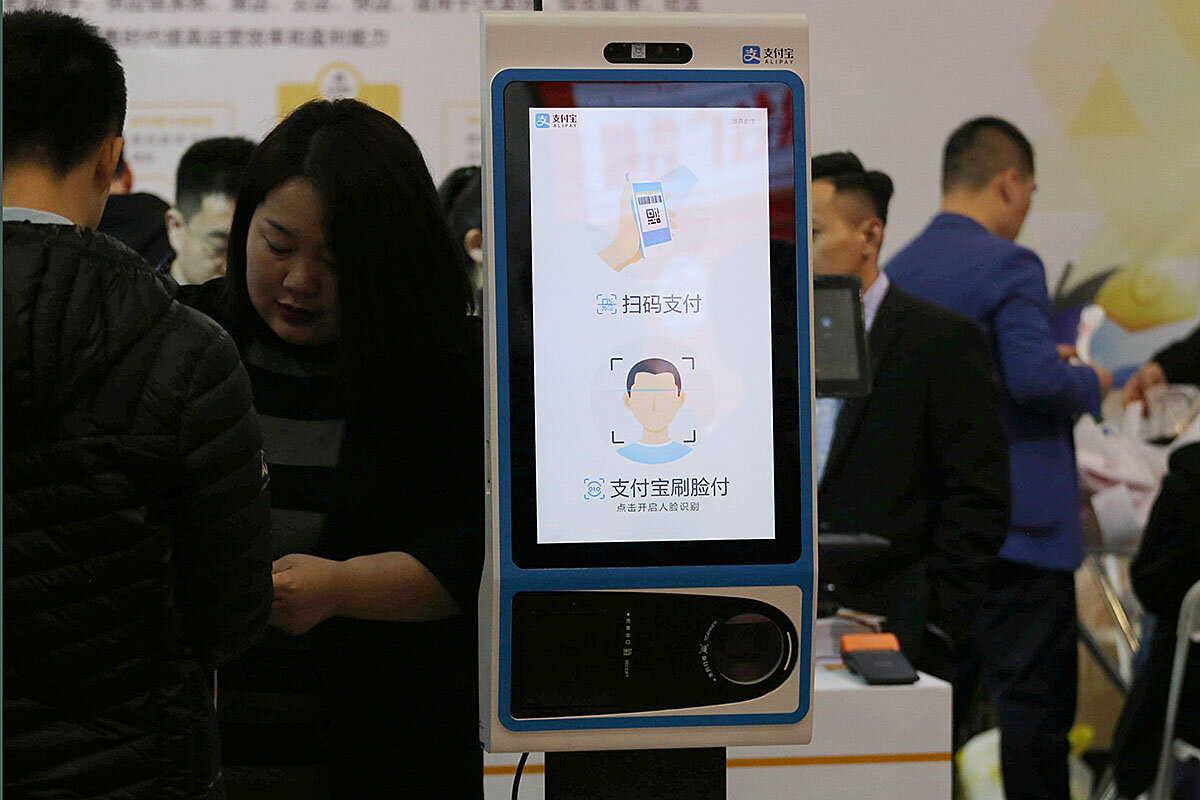Face off? Americans fear privacy loss to recognition software
Loading...
As facial recognition becomes more widespread, now appearing at check-ins for international flights, New York City apartment buildings, and even 24-hour convenience stores, more Americans are worried that public anonymity could become a thing of the past.
A poll released Wednesday by the market research company Morning Consult and the news outlet Politico, found support for facial recognition technology slipping among registered voters.
According to the survey, 42% approve of the technology, compared to 49% in August 2018. On Tuesday, a poll released by the American Civil Liberties Union of Massachusetts found that more than 9 in 10 voters in that state supported a state bill regulating how the government uses facial recognition, with nearly 8 in 10 supporting an outright moratorium.
Why We Wrote This
The rise of facial recognition technology threatens to undermine an implicit social contract: the ability to walk down a street and be anonymous.
Concerns about the technology – which uses sophisticated machine-learning algorithms to analyze facial features from a photo and match them with other photos that contain the same features – span the political spectrum. According to the Massachusetts survey, 84% of Democrats, 82% of independents, and half of Republicans favor a moratorium.
“There are interesting alliances and strange bedfellows in the privacy world,” says Kade Crockford, director of the Technology for Liberty program at the ACLU of Massachusetts. “There does remain in the United States thankfully a relatively deep mistrust of government power, which I think is a very healthy thing.”
Already a feature used in unlocking high-end phones, facial recognition technology offers the promise of a world of seamless check-ins, payments, and other convenient identity checks.
And then there’s the promise of catching criminals, including suspects who may have been photographed stealing a package from a doorstep or breaking into a car, says Daniel Castro, vice president of the Information Technology and Innovation Foundation, a tech-policy think tank in Washington, D.C. “If police are going to have to say in the future, ‘Sorry, we can’t do anything, we can’t run facial recognition to find the person because of a law,’ I don’t think most people are going to be happy with that,” he says.
The technology is already being used to combat far more grievous crimes. On Wednesday, Wired reported that a nonprofit combating human trafficking had developed a tool to match faces in online ads with police evidence to identify child victims of sex abuse.
Still, legislators in some cities are not buying the promise of increased security.
In May, San Francisco became the first U.S. city to ban the technology by law enforcement. Other cities considering bans are nearby Oakland and Berkeley, as well as Somerville, Massachusetts, a densely populated city in the Boston metro area. The Massachusetts legislature is also mulling a moratorium, backed by the ACLU of Massachusetts, on face recognition and other technology that can identify people at a distance by their voice, gait, or other immutable “biometric” features.
Also in May, members of the U.S. House Oversight and Reform Committee showed rare bipartisan unity in voicing deep concerns about the technology, which is built by companies like Amazon, IBM, Microsoft, and Google.
And last August, workers at these companies walked out or otherwise staged protests against their employers’ contracts with law enforcement, immigration enforcement, and the Pentagon. Facial recognition technology played a prominent role in the protests at Amazon and Microsoft.
A surveillance society
Currently there are no federal laws governing how law enforcement may use facial recognition, nor is it clear how many of the country’s roughly 18,000 police departments are currently using it. But the technology is inexpensive and user-friendly: In April, The New York Times surveilled a park in midtown Manhattan for less than $100 and were able to successfully identify passersby.
“The practice of setting up citywide networks of ‘smart’ surveillance cameras ... that is, to me, a total surveillance society,” says Mx. Crockford (who prefers a gender-neutral attribution). It could “enable government or anyone else to create a permanent and invasive record, not just of one person’s habits, associations, and movements, but of every person, and not on one day but on all days.”
Face recognition, says Mx. Crockford, could undermine an implicit social contract that makes cities what they are. “Cities are spaces of anonymity. ... The growth of the modern metropolis has provided people with a degree of freedom through anonymity that is kind of unprecedented. ... That’s why gay people move to cities, because we could be free in those places. I mean relatively free.”
Cities offer an ability to reinvent oneself, to break with the past to a certain extent, and the ability to do this might be crucial to some peoples’ mental well-being. In a paper published last year in the Journal of Medical Ethics, Stanford University psychiatrist Elias Aboujaoude argued that establishing a “modern privacy bill of rights” should be a public health priority.
“Privacy mediates some very important psychological processes,” he says. “When you look at mechanisms such as recovery after a setback for rejuvenation or catharsis … all have been shown to require privacy.”
Dr. Aboujaoude cited the positive public health implications of a European Union law that created in 2014 a “right to be forgotten” online. The EU’s General Data Protection Regulation, passed last year, further restricts how companies can use people’s identifiable information, including images of their faces.
Scoring citizens in a ‘smart city’
China’s privacy norms, meanwhile, have been trending in the opposite direction. The country’s Social Credit System, a national social and economic reputation system that assigns a score to every citizen, is expected to go online nationwide next year. Already, the system has been used to restrict individuals’ travel.
A Chinese advertisement for a new 5G network by the state-owned China Mobile illustrates how the Chinese government is promoting facial recognition as an asset to public safety. In the ad, an undercover police officer deploys several aspects of a “smart city,” including face surveillance, to arrest a wanted man.
We can’t assume that such a system won’t come to the United States, says Mx. Crockford, pointing out that, for nonwhite citizens in poor neighborhoods, aggressive surveillance by law enforcement is already a feature of daily life.
“It’s all very nice and well for a wealthy white person to say, ‘I’m not worried about that. We’re not China,’” Mx. Crockford says. “Well, why don’t you talk to a young black man from the Bronx about his experience with the government?”
Avoiding a race to the bottom
Some corporations may welcome greater public oversight of the technology. In a December blog post Brad Smith, the president of Microsoft, argued that 2019 should be the year that governments step in to regulate facial recognition.
“We don’t believe that the world will be best served by a commercial race to the bottom, with tech companies forced to choose between social responsibility and market success,” he wrote. “We believe that the only way to protect against this race to the bottom is to build a floor of responsibility that supports healthy market competition.”
Mr. Castro of ITIF, which receives funding from tech and telecom companies, argues that outright bans on government use could actually worsen the very problems that they aim to solve.
“It’s important for government to be an early adopter of some of these technologies,” says Mr. Castro. “They can say it is important for us that these technologies are generally neutral in terms of race, that they are not having significant errors and incentivize industry to prioritize that.”







